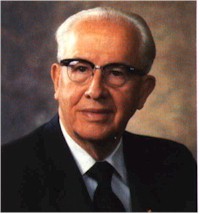
President Benson's Teachings About the Atonement |

by President Ezra Taft Benson
The Lord testified, "I came into the world to do the will of my Father, because my Father sent me. And my Father sent me that I might be lifted up upon the cross." (3 Nephi 27: 13-14.) And so He was. In Gethsemane and on Calvary, He worked out the infinite and eternal atonement. It was the greatest single act of love in recorded history. Thus He became our Redeemer—redeeming all of us from physical death, and redeeming those of us from spiritual death who will obey the laws and ordinances of the gospel. ("Keeping Christ in Christmas," Christmas Devotional, Salt Lake City, Utah, 1 December 1985.)
On the night Jesus was betrayed, He took three of the Twelve and went into the place called Gethsemane. There He suffered the pains of all men. He suffered as only God could suffer, bearing our griefs, carrying our sorrows, being wounded for our transgressions, voluntarily submitting Himself to the iniquity of us all, just as Isaiah prophesied (see Isaiah 53:4-6).
It was in Gethsemane that Jesus took on Himself the sins of the world, in Gethsemane that His pain was equivalent to the cumulative burden of all men, in Gethsemane that He descended below all things so that all could repent and come to Him. The mortal mind fails to fathom, the tongue cannot express, the pen of man cannot describe the breadth, the depth, the height of the suffering of our Lord—nor His infinite love for us. (Come Unto Christ, pp. 6-7.)
Because He was God—even the Son of God—He could carry the weight and burden of other men's sins on Himself. Isaiah prophesied our Savior's willingness to do this in these words: "Surely he has borne our griefs, and carried our sorrows. He was wounded for our transgressions, he was bruised for our iniquities: the chastisement of our peace was upon him; and with his stripes we are healed." (Isaiah 53:4-5.)
That holy, unselfish act of voluntarily taking on Himself the sins of all other men is called the Atonement. How one could bear the sins for all is beyond the comprehension of mortal man. But this I know: He did take on Himself the sins of all and did so out of His infinite love for each of us. He has said: "For behold, I, God, have suffered these things for all, that they might not suffer if they would repent; . . . Which suffering caused myself, even God, the greatest of all, to tremble because of pain, and to bleed at every pore, and to suffer both body and spirit—and would that I might not drink the bitter cup, and shrink." (D&C 19:16, 18.)
In spite of that excruciating ordeal, He took the cup and drank. He suffered the pains of all men so we would not have to suffer. He endured the humiliation and insults of His persecutors without complaint or retaliation. He bore the flogging and then the ignominy of the brutal execution—the cross. ("Jesus Christ: Our Savior, Our God," San Diego, California, 21 December 1979.)
No mortal being had the power or capability to redeem all other mortals from their lost and fallen condition, nor could any other voluntarily forfeit His life and thereby bring to pass a universal resurrection for all other mortals. Only Jesus Christ was able and willing to accomplish such a redeeming act of love. (Come unto Christ, p. 130.)
As was so characteristic of His entire mortal experience, the Savior submitted to our Father's will and took the bitter cup and drank. He suffered the pains of all men in Gethsemane so they would not have to suffer if they would repent. Only then did He voluntarily submit to death. Again, He explained: "No man taketh [my life] from me, but I lay it down of myself. I have power to lay it down, and I have power to take it again. This commandment have I received of my Father." (John 10:18.) (Come unto Christ, p. 130.)
We may never understand nor comprehend in mortality how He accomplished what He did, but we must not fail to understand why He did what He did. All that He did was prompted by His unselfish, infinite love for us. (Come unto Christ, p. 130.)
(See President Benson's Teachings About Christ, the Second Coming, and the Resurrection of Christ)
Teachings of Ezra Taft Benson, p. 14-15
Copyright by Bookcraft
All About Mormons |